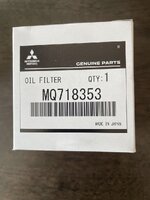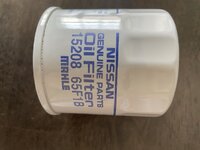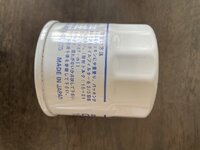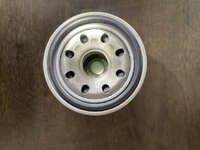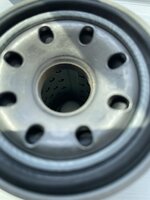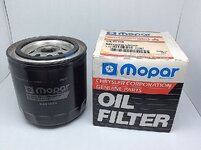Purchased Mitsubishi Oil Filter No. MQ718353 for a 2023 Mitsubishi Outlander. Ordered directly from a Mitsubishi Dealer. The box has the correct number and says Mitsubishi Motors Genuine Parts, MQ718353, Made in Japan. Inside the box the filter found says Nissan Genuine Parts, Oil Filter, 15208 65F1B, Mahle, Made in Japan. Any thoughts?
You are using an out of date browser. It may not display this or other websites correctly.
You should upgrade or use an alternative browser.
You should upgrade or use an alternative browser.
Mitsubishi Oil Filters
- Thread starter Baracoa
- Start date
Someone switched it either accidentally or intentionally.Any thoughts?
Filters looks like a short version of the Honda Mahle Tennex filter, which is a nice filter.
What's the common number for the mitsu filter and is it the same as a nissan.
Nissan is a 1/3 owner of Mitsubishi. Maybe they share some parts like Hyundai/Kia filters.
This ebay listing from Dubai looks identical to yours.


MQ718353 Genuine Mitsubishi OIL FILTER OEM | eBay
Find many great new & used options and get the best deals for MQ718353 Genuine Mitsubishi OIL FILTER OEM at the best online prices at eBay! Free shipping for many products!
www.ebay.com
Probably the same 4-cyl engine as Nissan uses.
If it’s the 2.5 then yes. Nissan PR25DD
Imagine twins wearing each other's clothes. 
Just like back in the day with ChryslerNissan is a 1/3 owner of Mitsubishi. Maybe they share some parts like Hyundai/Kia filters.
Attachments
If it’s the 2.5 then yes. Nissan PR25DD
Would you happen to know if the V6 is the same as Nissan's line up too?
Would you happen to know if the V6 is the same as Nissan's line up too?
If that’s an older Outlander with the 3.0 then that’s a Mitsubishi 6B.
- Joined
- Jun 8, 2022
- Messages
- 5,572
The Mahle filters louvers were never open enough for my liking. I have a couple here - Nissan branded - one I bought like 10 years ago, one I bought a year ago - both same issue. Both are from Mexico, so maybe the Japanese ones are better?
At my work all new Mitsubishis have the above filter installed. Strange days but it’s real.Someone switched it either accidentally or intentionally.
Filters looks like a short version of the Honda Mahle Tennex filter, which is a nice filter.
What's the common number for the mitsu filter and is it the same as a nissan.
Do you happen to know the efficiency on these filters?Purchased Mitsubishi Oil Filter No. MQ718353 for a 2023 Mitsubishi Outlander. Ordered directly from a Mitsubishi Dealer. The box has the correct number and says Mitsubishi Motors Genuine Parts, MQ718353, Made in Japan. Inside the box the filter found says Nissan Genuine Parts, Oil Filter, 15208 65F1B, Mahle, Made in Japan. Any thoughts?
We have a 2018 V6 and 2023 PHEV Outlander
Baracoa
Thread starter
I do not have any information on the efficiency of these filters. Unfortunately, it appears that these filters, which are also Nissan filters, do not publish much information regarding the matter. I used to be very concerned about efficiency rate years ago but after watching professional mechanics recommending OEM filters over after market ones, I do not worry much. I rather use the OEM filters which are specifically made for the vehicle you own. I have seen videos showing Toyota vehicles, for example, that have only used OEM filters, which are not well known for their efficiency, and yet those engines last 300,000 miles or more. The Mitsubishi filters are made in Japan and appear to be well constructed. They have small holes in the inner core instead of louvers which I, and others, prefer as there is no concern as with louvers which may not all be fully open. Also, if your car is under warranty, I believe it is better to use OEM filters to avoid any potential issues with a warranty claim. Hope this helps.Do you happen to know the efficiency on these filters?
We have a 2018 V6 and 2023 PHEV Outlander
Last edited:
That's the confusing thing... There are so many supporting sources that are for and against oem filters. I always read that the filter construction, flow etc is good. But filtration efficiency is terrible, and can contribute to long term wear.I do not have any information on the efficiency of these filters. Unfortunately, it appears that these filters, which are also Nissan filters, do not publish much information regarding the matter. I used to be very concerned about efficiency rate years ago but after watching professional mechanics recommending OEM filters over after market ones, I do not worry much. I rather use the OEM filters which are specifically made for the vehicle you own. I have seen videos showing Toyota vehicles, for example, that have only used OEM filters, which are not well known for their efficiency, and yet those engines last 300,000 miles or more. The Mitsubishi filters are made in Japan and appear to be well constructed. They have small holes in the inner core instead of louvers which I, and others, prefer as there is no concern as with louvers which may not all be fully open. Also, if your car is under warranty, I believe it is better to use OEM filters to avoid any potential issues with a warranty claim. Hope this helps.
Baracoa
Thread starter
You are correct about how confusing it can be trying to decide on OEM oil filters versus aftermarket ones. It appears that car manufacturers are more concerned with flow and bypass valve setting than with filtration rate. Frankly, you will be fine either way. The most important thing is changing your oil regularly. Professional mechanics usually recommend changing every 6 months or 5,000 miles, whichever comes first, regardless of oil and filter used.That's the confusing thing... There are so many supporting sources that are for and against oem filters. I always read that the filter construction, flow etc is good. But filtration efficiency is terrible, and can contribute to long term wear.
When I used to have a 2009 Prius, I ran OEM Toyota filters for a few years, simply because Amsoil did not have their EA versions yet. What I noticed consistently was that 4,000km into every oil change even using Amsoil SS oil, the sound of the engine would change. The sound "pitch" would change. When I finally was able to use a better filter, the pitch never surfaced even going 8,000km +You are correct about how confusing it can be trying to decide on OEM oil filters versus aftermarket ones. It appears that car manufacturers are more concerned with flow and bypass valve setting than with filtration rate. Frankly, you will be fine either way. The most important thing is changing your oil regularly. Professional mechanics usually recommend changing every 6 months or 5,000 miles, whichever comes first, regardless of oil and filter used.
In my opinion I attribute this pitch to the slow build up of fine particulate that the OEM can't filter.
In this Mitsu situation, I might stick with OEM for the year of free oil changes, then upgrade to better after. As I want to do 2 changes a year, which would range 8,000km-12,000km per change. I don't believe in super long OCI's, especially with our brutally cold winters we have here.
Baracoa
Thread starter
Many people prefer upgraded oil filters due to better filtration and in some cases better construction. Here in the USA it is apparently illegal to deny warranty service for using a filter other than OEM. Besides, it would seem very rare to encounter an engine issue due to using an upgraded oil filter, particularly a well known brand. Many of us simply use OEM filters during warranty period to avoid any potential problems in case warranty service is needed. I personally have never noticed a difference using OEM vs. aftermarket. We only use OEM in our 2023 Mitsubishi Outlander SEL and our Mazda CX-5, CX-9, and Mazda3. They seem well constructed and have holes in inner core rather than louvers which I prefer. But they may not be as good as others regarding filtration.
Similar threads
- Replies
- 8
- Views
- 1K
- Replies
- 20
- Views
- 3K
- Replies
- 30
- Views
- 5K
- Replies
- 15
- Views
- 2K

